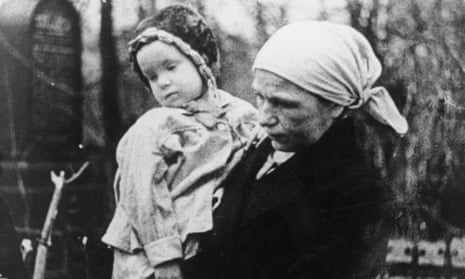The discovery of a huge number of unpublished diaries has given an extraordinary insight into one of the most notorious and brutal military sieges in history.
The siege of Leningrad by German and Finnish forces lasted 872 days, from September 1941 to 27 January 1944. Up to 2 million lives were lost, including about 800,000 civilians or 40% of the population of the city now called St Petersburg.
The diaries were collected by Alexis Peri, a history professor at Boston University, who stumbled across the personal records as she interviewed survivors, most of whom had been children during the second world war.
Peri told the Guardian: “They all gave me the same story – this heroic, triumphant battle, human resistance, collective solidarity. Then they would often start to take me into their trust and show me documents from their families. Letters initially, and then diaries.
“What fascinated me was that the diaries were so different from the stories I was getting. Even when they were from the same people. A diarist would give me the diary and then say something like: ‘I doubt there’s anything of interest in there, anything different from what we’ve already told you.’ But it was dramatically different.”
Peri unearthed more material in the city’s archives and was “blown away by how many people kept diaries”. The diaries reveal the true extent of the horrors of the time, as the civilian population struggled to survive without food, running water or fuel, and stricken by disease.
The siege became “an internal battle”, with starvation and isolation tearing into every aspect of everyday life and “every recess of the mind”, Peri said, “as opposed to the way that it’s always been presented as this clear clash of Germans versus Soviet people”.
Despair permeates the diary of Berta Zlotnikova, a teenager, who wrote: “I am becoming an animal. There is no worse feeling than when all your thoughts are on food.”
Other diarists wrote of their shock at seeing emaciated bodies of Leningraders in the local bathhouse, their bodies distorted and made physically androgynous by starvation. “Horrible, only skeletons, not people,” wrote Ivan Savinkov, a factory worker. “What will become of us?”
Aleksandra Liubovskaia was struck that men and women had become “so identical … Everyone is shrivelled, their breasts sunken in, their stomachs enormous, and instead of arms and legs just bones poke out through wrinkles.”
Describing the horror of washing her son, whose skin was covered with scurvy-induced blotches, she recalled Mary cleansing the body of her crucified son.
Peri will include the material in a book titled The War Within: Diaries from the Siege of Leningrad, to be published by Harvard University Press in January.
She spoke of her deep respect for the city’s people and what they went through: “Leningraders were indeed heroes for all that they endured. They suffered through the unimaginable. What interests me is that, in their diaries, they did not narrate themselves in heroic terms.
“They did not use the narrative of heroic resistance to describe their fight for survival, but found other ways to make sense of their suffering. They looked to literature, to history, etc. My book examines some of these alternative ways of articulating the ordeal of the blockade. My aim is not to negate the story of heroic resistance, but to show new dimensions of the siege experience.”
Peri added: “What comes over most of all is the way that starvation is this particularly tormenting form of dying, that not only forces the body to feed on itself and destroy itself, but wreaks havoc on the mind and destabilises all kinds of assumptions, relationships and fundamental beliefs.“There are many scenes with a diarist confronting themselves in the mirror and being unable to recognise themselves … It’s the type of death that really creates that type of internal destabilisation, as opposed to diaries that I’ve read from battle sites – the battles of Moscow and Stalingrad, where there’s a very clear enemy and that enemy is an external one. With starvation, the enemy becomes internalised.”
When the Soviet Union collapsed, many of the diaries were stored in former Communist party archives, but Peri found they had only partially been processed. “There were many more diaries that looked like they had not been really registered.”
While Russian history books focus on the battle and the front, which was a couple of miles from the city, the diaries “hardly ever dwell on the enemy”, Peri said. “They hardly ever mention Germans or fascists. What they really focus on are the people that are organising their lives and therefore their suffering – the local officials, neighbours, relatives, because they’re the immediate threat. It’s ‘my children lost our ration cards’ or ‘my neighbours are stealing from us’. Everyday life becomes a battleground.”
She observed that the diarists “don’t narrate their lives in tones of heroism and resistance”, adding: “Collective solidarity is fine for socialist ideology, but it’s really isolation that people experience.”
At least a dozen diarists likened themselves to Robinson Crusoe. The Soviet Union had long touted Daniel Defoe’s hero as an ideal socialist, somebody who builds a society from the ground up. “When the diarists talk about Robinson Crusoe, it’s ironic because they’re not thinking of him the way Soviet ideology has asked them to think,” Peri said.
One diarist lamented that “we are living the primitive life of savages on an uninhabited island”. Another wrote: “I think Robinson Crusoe was a lucky person. He knew with certainty that he was on an uninhabited island and had to rely only on himself. But I am among people.”
